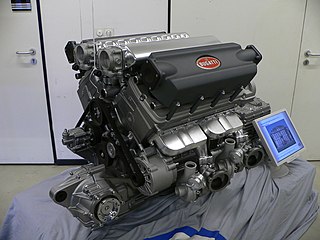
Mechanical engineering is an engineering branch that combines engineering physics and mathematics principles with materials science to design, analyze, manufacture, and maintain mechanical systems. It is one of the oldest and broadest of the engineering branches.

Computer-aided design (CAD) is the use of computers to aid in the creation, modification, analysis, or optimization of a design. CAD software is used to increase the productivity of the designer, improve the quality of design, improve communications through documentation, and to create a database for manufacturing. CAD output is often in the form of electronic files for print, machining, or other manufacturing operations. The term CADD is also used.

Manufacturing is the production of products for use or sale, using labor and machines, tools, and chemical or biological processing or formulation. It is the essence of secondary sector of the economy. The term may refer to a range of human activity, from handicraft to high-tech, but is most commonly applied to industrial design, in which raw materials from the primary sector are transformed into finished goods on a large scale. Such goods may be sold to other manufacturers for the production of other more complex products, or distributed via the tertiary industry to end users and consumers.
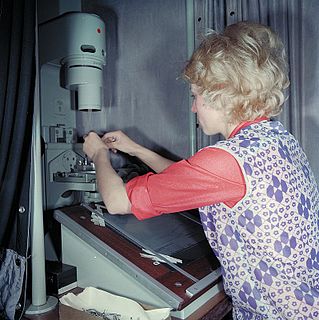
Quality control (QC) is a process by which entities review the quality of all factors involved in production. ISO 9000 defines quality control as "A part of quality management focused on fulfilling quality requirements".
Outsourcing is an agreement in which one company hires another company to be responsible for a planned or existing activity that is or could be done internally, and sometimes involves transferring employees and assets from one firm to another.
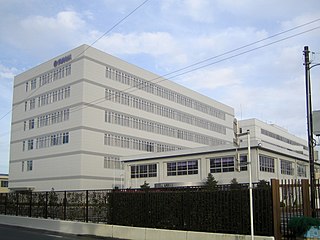
Yamaha Corporation is a Japanese multinational corporation and conglomerate with a very wide range of products and services. It is one of the constituents of Nikkei 225 and is the world's largest piano manufacturing company. The former motorcycle division was established in 1955 as Yamaha Motor Co., Ltd., which started as an affiliated company but later became independent, although Yamaha Corporation is still a major shareholder.

A rubber band is a loop of rubber, usually ring or oval shaped, and commonly used to hold multiple objects together. The rubber band was patented in England on March 17, 1845 by Stephen Perry. Most rubber bands are manufactured out of natural rubber or, especially at larger sizes, elastomer, and are sold in a variety of sizes.

Good manufacturing practices (GMP) are the practices required in order to conform to the guidelines recommended by agencies that control the authorization and licensing of the manufacture and sale of food and beverages, cosmetics, pharmaceutical products, dietary supplements, and medical devices. These guidelines provide minimum requirements that a manufacturer must meet to assure that their products are consistently high in quality, from batch to batch, for their intended use. The rules that govern each industry may differ significantly; however, the main purpose of GMP is always to prevent harm from occurring to the end user. Additional tenets include ensuring the end product is free from contamination, that it is consistent in its manufacture, that its manufacture has been well documented, that personnel are well trained, and that the product has been checked for quality more than just at the end phase. GMP is typically ensured through the effective use of a quality management system (QMS).
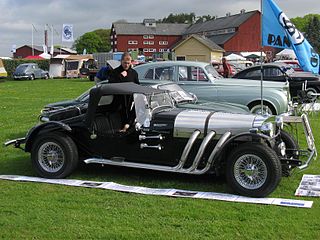
The Excalibur automobile was a car styled after the 1928 Mercedes-Benz SSK by Brooks Stevens for Studebaker. Stevens subsequently formed a company to manufacture and market the cars, which were conventional under their styling.

A toothpick is a small thin stick of wood, plastic, bamboo, metal, bone or other substance with at least one and sometimes two pointed ends to insert between teeth to remove detritus, usually after a meal. Toothpicks are also used for festive occasions to hold or spear small appetizers or as a cocktail stick, and can be decorated with plastic frills or small paper umbrellas or flags.

The Rust Belt is a region of the Northeastern and Midwestern United States that has been experiencing industrial decline starting around 1980. It is made up largely of the Great Lakes Megalopolis, though definitions vary. Rust refers to the deindustrialization, economic decline, population loss, and urban decay due to the shrinking of its once-powerful industrial sector, such as steel, automobile, and coal-mining jobs. The term gained popularity in the U.S. in the 1980s.

3D printing, or additive manufacturing, is the construction of a three-dimensional object from a CAD model or a digital 3D model. The term "3D printing" can refer to a variety of processes in which material is deposited, joined or solidified under computer control to create a three-dimensional object, with material being added together, typically layer by layer.
Methods engineering is a subspecialty of industrial engineering and manufacturing engineering concerned with human integration in industrial production processes.
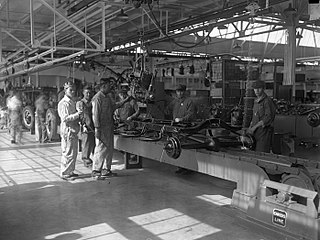
Operations management is an area of management concerned with designing and controlling the process of production and redesigning business operations in the production of goods or services. It involves the responsibility of ensuring that business operations are efficient in terms of using as few resources as needed and effective in terms of meeting customer requirements. Operations management is primarily concerned with planning, organizing and supervising in the contexts of production, manufacturing or the provision of services.

Chris Anderson is a British-American author and entrepreneur. He was with The Economist for seven years before joining WIRED magazine in 2001, where he was the editor-in-chief until 2012. He is known for his 2004 article entitled The Long Tail; which he later expanded into the 2006 book, The Long Tail: Why the Future of Business Is Selling Less of More. He is the cofounder and current CEO of 3D Robotics, a drone manufacturing company.

Grasshopper Manufacture Inc. is a Japanese video game developer founded on March 30, 1998 by Goichi Suda. They are well known for creating titles such as killer7 and the No More Heroes series.

Manufactured Landscapes is a 2006 feature-length documentary film about the work of photographer Edward Burtynsky. It was directed by Jennifer Baichwal and is distributed by Zeitgeist Films. It was the first of three documentary collaborations between Baichwall and Burtynsky, followed by Watermark in 2013 and Anthropocene: The Human Epoch in 2018.
In business, engineering, and manufacturing, quality has a pragmatic interpretation as the non-inferiority or superiority of something; it's also defined as being suitable for its intended while satisfying customer expectations. Quality is a perceptual, conditional, and somewhat subjective attribute and may be understood differently by different people. Consumers may focus on the specification quality of a product/service, or how it compares to competitors in the marketplace. Producers might measure the conformance quality, or degree to which the product/service was produced correctly. Support personnel may measure quality in the degree that a product is reliable, maintainable, or sustainable.
Velcro is a privately held company, founded by Swiss electrical engineer George de Mestral in the 1950s, that is known for being the original manufacturer of hook-and-loop fasteners.
The United Kingdom, where the Industrial Revolution began in the late 18th century, has a long history of manufacturing, which contributed to Britain's early economic growth. During the second half of the 20th century, there was a steady decline in the importance of manufacturing and the economy of the United Kingdom shifted toward services. Manufacturing, however, remains important for overseas trade and accounted for 44% of goods exports in 2014. In June 2010, manufacturing in the United Kingdom accounted for 8.2% of the workforce and 12% of the country's national output. The East Midlands and West Midlands were the regions with the highest proportion of employees in manufacturing. London had the lowest at 2.8%.














